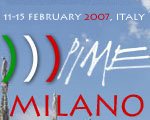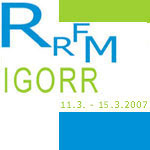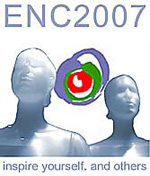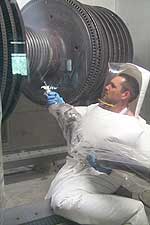 |
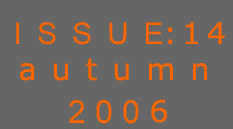 |
Issue No.14 Autumn
|
| ENS News |
| ENS Events |
| Member Societies & Corporate Members |
| ITER, a major step toward nuclear fusion energy Reactor Kinetics Equations applied to the start-up phase of a Ringhals PWR SCK•CEN: A centre of scientific excellence Interview of Eric van Walle, new Head of SCK-CEN A “humanising” process: Making
science stimulating and relevant to young people |
| European Institutions |
| European Commission outlines Joint Undertaking proposal on ITER |
| ENS World News |
ENS Members |
| Links to ENS Member
Societies Links to ENS Corporate Members Editorial staff ______________________ |
| _____________________ |
| _____________________ |
| _____________________ |
| _____________________ |
|
|
|
|
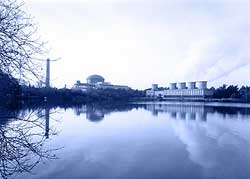 |
Now, more than fifty years later, the post-war techno-scientific optimism that characterised societal thinking is balanced with an increased sensitivity for ecological and social aspects. But the aim of the founders of SCK•CEN, which is now called the “Belgian Nuclear Research Centre”, remains the same: “Within the context of sustainable development…”, |
SCK•CEN states, “…our research aims to study new nuclear technologies, as well as medical and industrial applications, and to contribute to nuclear safety, radiation protection and the care for the backend of the nuclear fuel cycle”.
About six hundred academic researchers and technical and administrative employees work in the laboratories and offices in Mol and Brussels, and their areas of expertise range in scope, quite literally, from the deep underground to outer space. SCK•CEN’s research activities are concentrated into three main areas: ‘materials sciences’, ‘advanced reactor systems’ and ‘health safety and environment’. In addition, the centre also aims to play a role in the ongoing debate on nuclear issues by serving as a ‘platform for reflection’ on risk governance issues and on policy related to the applications of radioactivity in general. This summary highlights some of those activities. A full overview and contact details can be found on the Centre’s website at: www.sckcen.be
Research related to material sciences and advanced reactor systems
In the broad field of nuclear energy technologies, SCK•CEN focuses on the development and validation of materials and advanced fuel designs, for both fission (for present power reactors up to Generation IV) and fusion applications (ITER, DEMO). In addition to theoretical research, the Centre runs a variety of experimental programmes in its test reactors BR1, BR2 and VENUS in support of safety aspects relating to the present generation of NPP's. Within the context of the decision to build ITER in France and the future DEMO plant, the Centre concentrates its fusion research on the behaviour of materials under representative irradiation conditions. This entails research on the radiation resistance of materials for the first wall, the vessel assembly and the blanket, and on the radiation resistance of instrumentation components.
| SCK•CEN also pays special attention to the optimisation of the back-end of the nuclear fuel cycle, in particular to the treatment of irradiated fuel or the separation of actinides and long-lived fission products from the residual waste that needs to be stored. The separated isotopes can then be transmuted into |
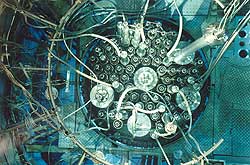
|
short-lived or stable fission products in an accelerator driven system or a fast reactor. On the request of the Japanese IRI (Institute for Research and Innovation), SCK•CEN is testing a revolutionary new treatment project for the separation of actinides and long-lived fission products from the back-end fuel flows that are suitable for geological disposal.
MYRRHA, an Accelerator Driven System and a sub-critical installation that has to be fed with an outside source to produce neutrons in support of the nuclear reaction, is a demonstration machine operating within the framework of the European research programme EUROTRANS (EUROpean Research Programme for the TRANSmutation of High-Level Nuclear Waste in an Accelerator Driven System). The aim of this particular research project is to demonstrate that it is technically possible to transmute high-level and long-lived radioactive waste with an accelerator driven system.
Research related to health, safety and environment.
Meanwhile, the Centre is about to finish the dismantling of the BR3 reactor. This reactor was the first ever pressurised water reactor (PWR) in operation on the European mainland, and its dismantling can be considered as a reference ‘test case’ for developing the necessary experience for the future dismantling of commercial PWRs.
Last years, the PRACLAY experiments at Mol attracted wide attention from the scientific community and from politicians. They fit in well with the research currently going on into the suitability of Boom clay as a host formation for the secure storage of high-level, medium-level and long-lived radioactive waste. Tests with a source of heat that simulates the radiant heat of the waste will continue for more than 10 years and contribute to gaining a better idea of the impact that this heat has on the characteristic features of Boom clay.
As one of the world’s first ever nuclear research institutes dedicated to the peaceful use of nuclear energy, the Belgian Nuclear Research Centre was officially recognised this year as an "IAEA Collaborating Centre" by the International Atomic Energy Agency (IAEA). This reflects the close collaboration that exists between SCK•CEN and the Agency in the field of radioecology.
|
|
Materials and instruments are also tested for their cosmic radiation resistance qualities as part of space research. In addition, research on the stability of micro-organisms under extreme circumstances is still ongoing. Scientists at SCK•CEN examine whether the organisms that have been selected for the bioreactor – which has to transform human waste products into food and oxygen during long space missions – could mutate under the influence of cosmic radiation and, thus, put the bioreactor out of action. In the near future, SCK•CEN will study the effect of space on the behaviour of bacteria and will perform advanced biochemical and molecular tests |
on blood samples of astronauts working at the International Space Station. Radiobiology research is also performed ‘on the ground’: the Laboratory of Radiobiology is world famous for its studies on the effects of low-dose ionising radiation on the development of organisms. It has a special focus on female germ cells, the pre- and early post-implantation stages, and the embryonic developing brain.
Communication, education and the study of the social dimension.
When it comes to studying the human brain, research at SCK•CEN naturally goes hand-in-hand with education and training. In addition to its own education and training activities with regard to radiological protection, SCK•CEN also co-ordinates two education and training projects within the EURATOM Research Programme of the European Commission (Sixth Framework Programme, FP6). The ENETRAP project (European Network for Education and Training in Radiological Protection) aims at harmonising and integrating national education and training programmes in the domain of radiation protection. This will contribute to develop a European policy on radiation protection and a common safety culture. The FP6-BNEN project developed an evaluation methodology for the assessment of education and training programmes. This methodology is implemented in Belgium by a consortium of six Belgian universities and SCK•CEN, which is called the BNEN (Belgian Nuclear higher Education Network). BNEN has been organising a common education programme for nuclear engineers since 2002. The programme’s aim is to share its accumulated experience with Belgium’s European neighbours and to contribute to the realisation of the "European Research Area". Moreover, SCK•CEN grants on a yearly basis several PhD and post-doctoral projects to international researchers - in collaboration with Belgian universities.
Understanding the benefits and risks of radioactivity and its applications not only requires technical insight and training, but also an understanding of the context and a sensitivity for the social and philosophical aspects of a particular context. At SCK•CEN, societal aspects related to policy and decision-making in nuclear issues, such as risk perception and governance, and the involvement of local communities in the location of waste management facilities, are investigated in close collaboration with universities. The observations that can be made from these studies give nuclear researchers more insight into the complex social and ethical aspects associated with nuclear applications and also shed new light on how to organise - in a more effective way - dialogue and interaction with civil society.
Challenges and opportunities
Like most nuclear institutes and companies, SCK•CEN has to keep up with growing competition in what is a small but specific (research) market. At the same time, it has to respond to shifting public and political perceptions on nuclear by showing its openness to answer questions on hot topics such as energy policy, climate change and radioactive waste management. According to Eric van Walle, the new General Manager, the recent re-organisation of SCK•CEN will enable the Centre to fulfil, better than ever, its mission.
ENS NEWS recently interviewed Eric
and here is what he had to say about the work, aims and future
of SCK-CEN.
| |
